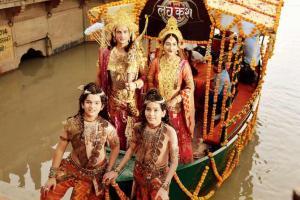Observing the launch of the TV epic Ram Siya Ke Luv Kush held on the banks of river Sarayu

Himanshu Soni, Shivya Pathania, child actors Harshit Kabra and Krish Chauhan enter the show launch on a boat at Guptar Ghat
What's common to Malgudi and Ayodhya? River Sarayu flows through both. While Malgudi is a fictional town created by writer RK Narayan (made popular by the '80s TV show Malgudi Days), present-day Ayodhya, like any other small-town in Uttar Pradesh, is of course an unrecognisably pale shadow of what may have been imagined as Lord Ram's capital by the same name, in the epic Ramayan. Be that as it may, Guptar Ghat, on the banks of Sarayu, going through a makeover, much like Mumbai's Bandstand, is the most apt setting/venue that the TV channel Colors could've come up with to unveil their massive, multi-crore rendition of the Ramayan — Ram Siya Ke Luv Kush.
Guptar Ghat is, in fact, in the town Faizabad, with a fair mix of neat/green Cantonment areas, and general civic chaos, and congestion. Of which Ayodhya was a part. Now the entire district has been renamed Ayodhya. "It's like calling Mumbai, Bandra or Borivali," a local wit tells us. The banks are flanked by two Ram temples, in rather dilapidated conditions. But the buzz on the promenade, like with any windy waterfront, is palpable — people milling around in the evening, attacking bhuttas (corn cobs), clicking selfies…
Over 1000 people were involved in creating the set of the show in Umbergaon. 35 artistes were called to design and paint the set. Overall budget is approximately Rs 650 crore.
"Is Ram on his way?" A crew member asks around. "Can we please call him Himanshu [Soni, who plays Ram on the show]," his colleague sternly cautions, hoping not to excite a crowd into commotion, sensing Lord Ram is (literally) on his way. Well, he is; or at least actors Soni, and Shivya Pathania (playing Sita), in full costume, are supposed to boat down the river toward the main stage.
There have been several Ramayans televised on various channels over the past couple of decades. Yet, the enduring TV image of Maryada Purshottam, remains actor Arun Govil's from Ramanand Sagar's Ramayan, over three decades ago! This is natural for those who were around during those simpler, single-channel times. Or were later disappointed to find that Govil was so human after all — watching him dig into a bag of theplas on an international flight, as I once did!
But Ayodhya's connect with Doordarshan's traffic-stopping series is perhaps strongest now. At the corner of Guptar Ghat is a big screen, mounted on a truck, with a picture of UP Chief Minister Yogi Adityanath, that plays DD's Ramayan every evening. Regulars can even ask for a re-run of an episode they may have missed the previous day. Even elsewhere, we noticed the same Ramayan — personally commissioned by then Prime Minister Rajiv Gandhi — playing from trucks on the main streets of this BJP stronghold.
What do we instantly recall about that '80s Ramayan most? One would imagine the battle sequences; more specifically, two warriors fighting with arrows that meet mid-way, suspended in air, and then the weaker one disappears! Does the new version reprise that?
The show's producer Siddharth Kumar Tewary, who was too young when the first Ramayan aired, says he realised the power of the arrow-trope while shooting Mahabharat years ago: "People fought for days. How do you compress that into two minutes on screen, since the show must also capture emotions? It can be done quite simply, when you know, who has which arrow. And who won the round. In Mahabharat, we got invisible arrows to appear with the pull of the kamaan [bow's string]. The idea is also to use modern technology to effectively tell a story to a new generation."
Tewary says his version starts from the point Ramayan ends —which is the return of Ram and Sita into a celebratory Ayodhya. And it is told through the eyes of their children, Luv and Kush: "Interpretation is key. The whole narrative completely changes depending on the lens you view it from. This is what we did with the show Suryputra Karn, looking at Mahabharat anew as well."
Almost in line with Vishnu's avatars, actors Soni and Pathania, playing Ram and Sita, had played (older versions of) Krishna and Radha in the first episode of Tewary's Radha Krishn, which is a teenaged romance. A reason to pick the cast is also the time they're willing to spare: "These aren't regular shoots, where you get to work, act, and go home."
The entire cast and crew of Ram Siya Ke Luv Kush are stationed for months in Umbergaon in Gujarat, where Tewary owns/runs a 20-acre studio, simultaneously shooting Chandragupta Maurya, and Radha Krishn. Evidently Tewary is TV's history-mythology czar of sorts.
"It [Ramayan] is history, not mythology," Tewary corrects. Well, it's a question more central to the disputed site at the Ram Janmabhoomi in Ayodhya — as we drive down 15 kilometres from Guptar Ghat, towards a series of fences, barricades, gates, and barbed wires, with a massive police deployment protecting a make-shift Ram temple inside. That's another drama altogether — almost of the same proportion as Ramayan — playing out in the Supreme Court currently.
Catch up on all the latest entertainment news and gossip here. Also download the new mid-day Android and iOS apps to get latest updates
 Subscribe today by clicking the link and stay updated with the latest news!" Click here!
Subscribe today by clicking the link and stay updated with the latest news!" Click here!







